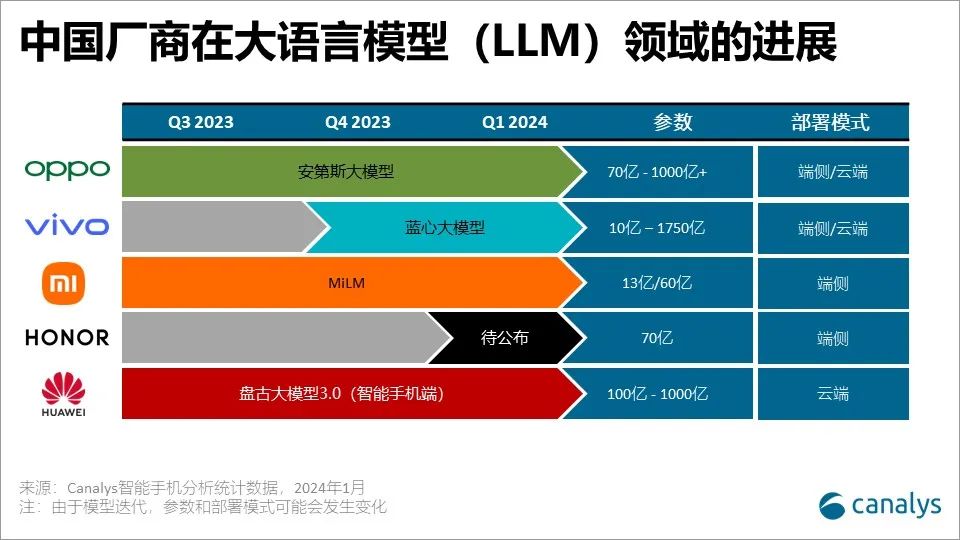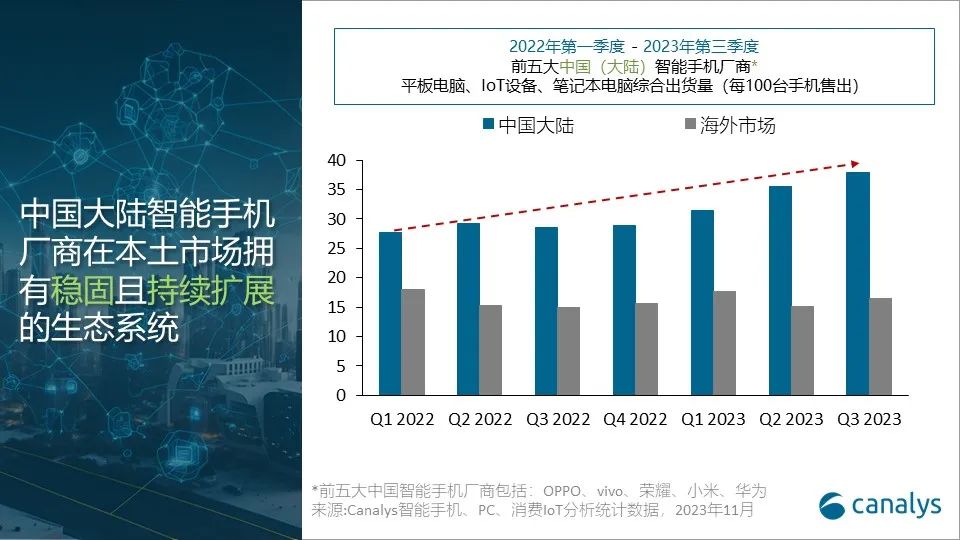 Hardware Tutorial
Hardware Tutorial
 Hardware News
Hardware News
 AI development momentum and potential of the five major Chinese mobile phone manufacturers: Canalys report
AI development momentum and potential of the five major Chinese mobile phone manufacturers: Canalys report
AI development momentum and potential of the five major Chinese mobile phone manufacturers: Canalys report
According to a recent report released by Canalys, a well-known technology market analysis organization, under the current market structure, AI is becoming a strategic priority for manufacturers.
In order to stand out in the fierce market competition, Chinese smartphone manufacturers are treating AI as an important strategy. With Huawei's re-emergence in the market, defending market share and investing in the development of new and eye-catching features have gradually become the focus of other manufacturers, and AI is expected to become a key factor in this strategic change.
Some local manufacturers with strong horizontal integration capabilities are strategically applying AI to a wider range of hardware categories. This enables the deployment of AI not only to be limited to a single category of mobile phones, but also to a wider range of hardware such as PCs, wearables, TVs, and even cars.
In this way, manufacturers can build a more complete and interconnected ecosystem, and AI can play a key role in it, enhancing the functional experience of a single device and the connectivity between multiple devices.
In addition, as Chinese manufacturers transition to high-end strategies, the market still needs new driving forces in addition to technologies such as foldable screens and 5G. AI, especially the ability to run through generative large models on the hardware side, will boost the growth of the high-end market.
Canalys predicts that the demand for end-side AI capabilities is expected to stimulate a new round of replacements and help increase the average selling price (ASP) of equipment. Manufacturers' strategic focus on AI deployment is also closely linked to the path to high-end, and AI capabilities will also become an effective starting point for manufacturers to promote high-end.
Recently, China’s local smartphone manufacturers have been actively investing in self-developed large language models (LLM). The following are several LLMs recently launched by Chinese manufacturers that will be installed on smartphones.

With the iteration of SoC and the recent rapid upgrade of storage configurations (especially DRAM) on the market, although most Chinese manufacturers still adopt a device-cloud hybrid AI deployment model, But it has also begun to focus more on the capabilities of end-side AI.
The ecological advantages of local manufacturers in the local market enable AI to play a greater role
Compared with its overseas markets, Chinese local manufacturers often have higher add-on rates in the local market and provide It provides a more comprehensive hardware product coverage, and these factors can make AI benefit a wider range of users and application scenarios. For example, Xiaomi's Mijia ecosystem and Huawei's Hongmeng Smart Connect have established a considerable user base in the country.

In addition to providing wearable devices and tablets locally that are also sold overseas, these manufacturers also actively cooperate with local ecological partners to provide products such as home appliances and even More extensive ecological hardware such as cars. With the wide coverage of hardware categories and a more solid user base, AI is expected to play a greater role, leading to more diverse usage scenarios and a more seamless multi-device experience.
High-performance equipment with affordable prices promotes the development of end-side AI
Canalys predicts that Chinese manufacturers will take the lead in bringing AI-capable smartphones into lower price ranges, thus accelerating AI Cell phone penetration. Taking into account the fierce market competition, supply chain cost advantages and local consumers' recognition of cost-effective equipment, local manufacturers have begun to provide flagship-level performance products at extremely competitive prices.
These devices with end-side generative AI running performance and equipped with generative AI features will provide a relatively differentiated use experience. Local manufacturers are expected to have a greater advantage in the mid-range market. Since overseas manufacturers will be difficult to provide equipment with the same hardware performance in the corresponding price range, their end-side AI experience in the mid-range market will be far behind that of local manufacturers.
Local manufacturers (such as Huawei) with strong brand appeal can gain a competitive advantage by establishing close cooperative relationships with local developers. Recently, Chinese software giants (such as Meituan, Alibaba, etc.) have begun to actively cooperate with Huawei to develop native applications for Huawei's HarmonyOS NEXT operating system that are independent of the Android application ecosystem.
Localized operations are the key to spawning an AI application ecosystem
By analogy, when third-party developers need to integrate large AI models in their applications, the same cooperation model may also occur. This cooperation model can provide exclusive, high-quality and differentiated experiences in the future wave of AI application development, thereby creating competitive advantages for manufacturers.
The above is the detailed content of AI development momentum and potential of the five major Chinese mobile phone manufacturers: Canalys report. For more information, please follow other related articles on the PHP Chinese website!

Hot AI Tools

Undresser.AI Undress
AI-powered app for creating realistic nude photos

AI Clothes Remover
Online AI tool for removing clothes from photos.

Undress AI Tool
Undress images for free

Clothoff.io
AI clothes remover

Video Face Swap
Swap faces in any video effortlessly with our completely free AI face swap tool!

Hot Article

Hot Tools

Notepad++7.3.1
Easy-to-use and free code editor

SublimeText3 Chinese version
Chinese version, very easy to use

Zend Studio 13.0.1
Powerful PHP integrated development environment

Dreamweaver CS6
Visual web development tools

SublimeText3 Mac version
God-level code editing software (SublimeText3)

Hot Topics
 How to use the chrono library in C?
Apr 28, 2025 pm 10:18 PM
How to use the chrono library in C?
Apr 28, 2025 pm 10:18 PM
Using the chrono library in C can allow you to control time and time intervals more accurately. Let's explore the charm of this library. C's chrono library is part of the standard library, which provides a modern way to deal with time and time intervals. For programmers who have suffered from time.h and ctime, chrono is undoubtedly a boon. It not only improves the readability and maintainability of the code, but also provides higher accuracy and flexibility. Let's start with the basics. The chrono library mainly includes the following key components: std::chrono::system_clock: represents the system clock, used to obtain the current time. std::chron
 Decryption Gate.io Strategy Upgrade: How to Redefine Crypto Asset Management in MeMebox 2.0?
Apr 28, 2025 pm 03:33 PM
Decryption Gate.io Strategy Upgrade: How to Redefine Crypto Asset Management in MeMebox 2.0?
Apr 28, 2025 pm 03:33 PM
MeMebox 2.0 redefines crypto asset management through innovative architecture and performance breakthroughs. 1) It solves three major pain points: asset silos, income decay and paradox of security and convenience. 2) Through intelligent asset hubs, dynamic risk management and return enhancement engines, cross-chain transfer speed, average yield rate and security incident response speed are improved. 3) Provide users with asset visualization, policy automation and governance integration, realizing user value reconstruction. 4) Through ecological collaboration and compliance innovation, the overall effectiveness of the platform has been enhanced. 5) In the future, smart contract insurance pools, forecast market integration and AI-driven asset allocation will be launched to continue to lead the development of the industry.
 Which of the top ten currency trading platforms in the world are the latest version of the top ten currency trading platforms
Apr 28, 2025 pm 08:09 PM
Which of the top ten currency trading platforms in the world are the latest version of the top ten currency trading platforms
Apr 28, 2025 pm 08:09 PM
The top ten cryptocurrency trading platforms in the world include Binance, OKX, Gate.io, Coinbase, Kraken, Huobi Global, Bitfinex, Bittrex, KuCoin and Poloniex, all of which provide a variety of trading methods and powerful security measures.
 Recommended reliable digital currency trading platforms. Top 10 digital currency exchanges in the world. 2025
Apr 28, 2025 pm 04:30 PM
Recommended reliable digital currency trading platforms. Top 10 digital currency exchanges in the world. 2025
Apr 28, 2025 pm 04:30 PM
Recommended reliable digital currency trading platforms: 1. OKX, 2. Binance, 3. Coinbase, 4. Kraken, 5. Huobi, 6. KuCoin, 7. Bitfinex, 8. Gemini, 9. Bitstamp, 10. Poloniex, these platforms are known for their security, user experience and diverse functions, suitable for users at different levels of digital currency transactions
 How much is Bitcoin worth
Apr 28, 2025 pm 07:42 PM
How much is Bitcoin worth
Apr 28, 2025 pm 07:42 PM
Bitcoin’s price ranges from $20,000 to $30,000. 1. Bitcoin’s price has fluctuated dramatically since 2009, reaching nearly $20,000 in 2017 and nearly $60,000 in 2021. 2. Prices are affected by factors such as market demand, supply, and macroeconomic environment. 3. Get real-time prices through exchanges, mobile apps and websites. 4. Bitcoin price is highly volatile, driven by market sentiment and external factors. 5. It has a certain relationship with traditional financial markets and is affected by global stock markets, the strength of the US dollar, etc. 6. The long-term trend is bullish, but risks need to be assessed with caution.
 What are the top ten virtual currency trading apps? The latest digital currency exchange rankings
Apr 28, 2025 pm 08:03 PM
What are the top ten virtual currency trading apps? The latest digital currency exchange rankings
Apr 28, 2025 pm 08:03 PM
The top ten digital currency exchanges such as Binance, OKX, gate.io have improved their systems, efficient diversified transactions and strict security measures.
 Bitcoin price today
Apr 28, 2025 pm 07:39 PM
Bitcoin price today
Apr 28, 2025 pm 07:39 PM
Bitcoin’s price fluctuations today are affected by many factors such as macroeconomics, policies, and market sentiment. Investors need to pay attention to technical and fundamental analysis to make informed decisions.
 Which of the top ten currency trading platforms in the world are among the top ten currency trading platforms in 2025
Apr 28, 2025 pm 08:12 PM
Which of the top ten currency trading platforms in the world are among the top ten currency trading platforms in 2025
Apr 28, 2025 pm 08:12 PM
The top ten cryptocurrency exchanges in the world in 2025 include Binance, OKX, Gate.io, Coinbase, Kraken, Huobi, Bitfinex, KuCoin, Bittrex and Poloniex, all of which are known for their high trading volume and security.





